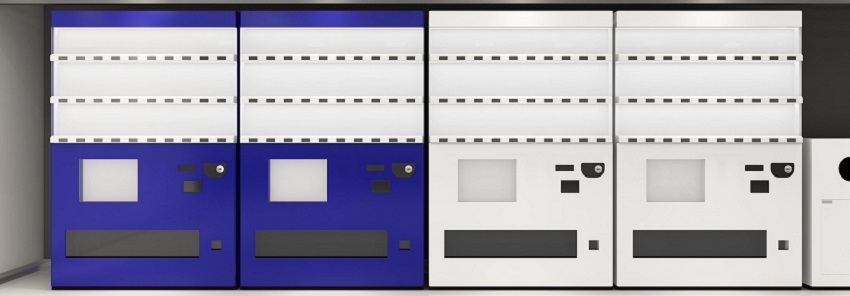compare multiple quotes from Agreed Suppliers
- Save time and money by letting us do the legwork for you
- We will look at the most suitable and competitive providers for you
- Our expert service is 100 % free with no-obligation
- Get the options to make an informed decision and get the best deal
Vending machines: Industrial vending machines, the new cost-killers
Vending machines are not only there to sell the usual bag of crisps, sodas and candies in a company’s recreation room. The recent rise of industrial vending machines represents a complete makeover of the concept, and define these machines as internal cost-cutting tools. How does it work? Industrial vending machines provide access to industrial supplies used by the workers. They don’t need to pay for the items but have to swipe their badge to allow distribution. The machine is therefore used as a tracking device which updates inventory data in real time, and even more importantly, makes all employees accountable for the inventory, thus contributing to reduce wasteful behaviours.
What are the benefits of these machines, and which companies will enjoy these benefits the most? How can these machines be obtained, and how much do they cost?

Benefits of industrial vending machines
The key benefit of these machines is provide point-of-use access to industrial supplies, which allows faster distribution of supplies, real time tracking, increased workforce accountability and ultimately significant savings.
Faster supplies
Employees no longer need to go to a specific warehouse to get the supplies they need to do their job. The machine is right there where supplies are needed, and everything that’s needed is in the machine. Supplies are obtained in a much faster, more efficient way.
Tracking
Managers can monitor all data collected by the vending machines so as to know exactly what supplies were taken off inventories, when, and by which employee. If the data doesn’t match planned values, documented investigations can be enforced.
Accountability
Industrial vending machines make employees aware and accountable for corporate resources consumed. An employee will typically think twice about wasting his supplies and getting a new batch when he knows he’s precisely tracked. Some companies further strengthen this feeling by displaying price tags next to the supplies in the machine.
Savings
At the end of the day, these machines produce significant savings through several channels:
- they limit the amount of resources engaged in worker-related inventory,
- they bring supplying-related paperwork down to nought,
- they reduce inventory costs - according to machine supplier AutoCrib, a companywhich installs its vending machines reduce inventory spend by 20% to 50%.
Which companies need industrial vending machines?
While these benefits are a reality, some companies will enjoy them more than others.
Key factors are the economic sector where the company is doing business, and company size.
Industries
These vending machines will typically be more appreciated in industries which need many divisible supplies:
- Manufacturing,
- Aerospace,
- IT services,
- Engineering
- And above all maintenance, repair, and overhaul (MRO) distributors.
Company size
Most companies using industrial vending machines employ more than 100 employees.
Suppliers and prices
As a burgeoning business, industrial vending machines have a small but growing number of suppliers. Because the price of these machines is pretty high, many solutions other than outright purchase are available.
Main suppliers
Main suppliers include:
- Autocrib
- Brammer
- WW Grainer
- MSC Industrial Direct
- Silkron
Prices
A typical machine costs £10,000 to £15,000. Since this represents a significant investment, many usage schemes are in place:
- The distributor owns the machine, installs, maintains and refills it, running both the vending and inventory management businesses - this is the cheapest option
- The purchases or leases the machine and remains responsible for everything - since machines can be used for over 20 years, this solution is more economical in the long run.
- Maintenance, refills and installation are managed by an integrator - this is better for larger users.





